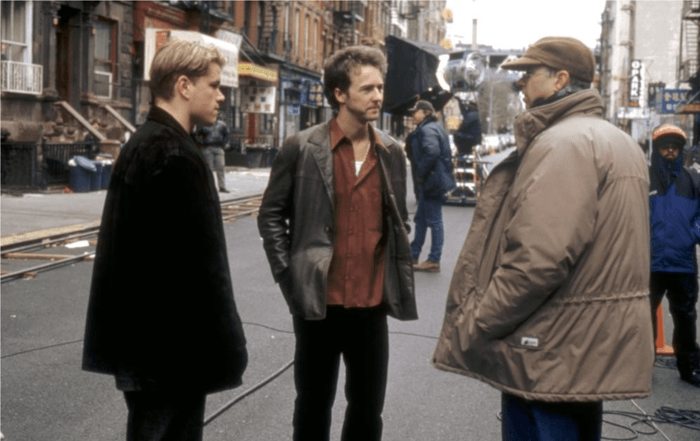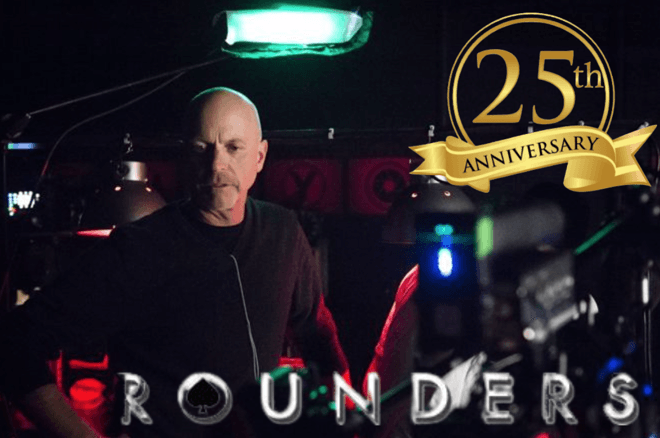Last month, PokerNews spent a significant amount of time celebrating the 25th anniversary of the beloved poker movie Rounders. That included five things you didn’t know about the movie, an interview with Johnny Chan, and remembering the time Doyle Brunson busted Matt Damon from the 1998 World Series of Poker (WSOP) Main Event.
When it came out in 1998, Rounders was, at best, a moderate box office success, but the box office fails to give you any sense of the movie’s cultural impact on the poker community. Rounders was the first length of fuse laid down for the poker boom and provided a fillip for hundreds of professional poker careers (not to mention the odd poker writer).
For the 25th Anniversary of the movie, John Dahl, the director of Rounders, hopped on a Zoom call with PokerNews. In the ensuing interview, he discussed the movie’s longevity, what it was like working with Johnny Chan, and how the movie got made in the first place.
Dahl even weighs in on the possibility of a sequel.
Origins of Rounders
“I was working with Miramax at the time,” Dahl told me, explaining how he first heard of the project. “There was a movie we were trying to make that was getting stalled in the casting. They came to me and said, ‘We have this other movie we want to make called Rounders. Read it.’”
“So I read it and really liked the script. Off the back of that I met with Brian [Koppelman] and David [Levien]. They said they had this guy called Matt Damon.”
“It turns out that actors love playing cards—we got pretty much everybody we wanted to get into that movie.”
“I said, ‘Who is that?’”
The Rounders team got lucky landing Damon right before his star took off (Miramax showed Dahl clips from an early cut of Good Will Hunting to sell him on Damon’s casting). However, Damon wasn’t the movie’s only lucky break.
“It was kind of a charmed movie in a way,” Dahl says. “It was Brian and David’s first movie, Matt was just blowing up at the time. Plus it turns out that actors love playing cards—we got pretty much everybody we wanted to get into that movie. We got Martin Landau [who plays Mike McDermott’s law professor]. He was amazing. His scenes are great. And the judges game—you put all those interesting faces around a card table and you could really feel that you had something.”
Rounders 25th Anniversary: Erik Seidel Says Film Accurately Portrayed NYC Underground
Another big get for the movie was landing John Malkovich to play the film’s main villain. Teddy KGB may have worked on the page, but it was Malkovich’s performance that made him a poker icon.
“We convinced Malkovich’s agent to send him the script. He shows up, we ask him ‘Do you want a dialogue coach or a Russian coach?’ he said, ‘Nope. I’ve got it.’”
“So, he come’s onto set with a little recorder and he’s had this Russian friend of his record read all the dialogue into the recorder for him. So, he’d sit there, listen to the recorder, and then repeat the dialogue. The first time we heard it we were going like ‘What?’ He said, ‘You know, sometimes when people learn languages, they just pick up these tics.’”
“There was a bit of concern about it.” Dahl chuckled before adding, “I kind of thought it was great.”
Pre-Production
No other movie has captured the argot of professional poker players the way Rounders did. The movie is thick with card slang and gambling jargon. Even away from the poker rooms, it’s a movie written in specialist languages—sports references, law school vernacular, Hebrew theology.
“It was really interesting to take people inside what was a pretty obscure game at the time and teach them what was at stake.”
“I felt it was like a sports movie,” Dahl explained when I asked him about balancing clarity and authenticity. “It was inside the world of cards like I’d never seen before, so the specificity of the language mattered. It’s exactly the way these people talk.”
“Miramax was concerned people wouldn’t understand it, but my argument was that if you go inside a professional world you adopt the language. If people don’t fully understand it, that’s okay. They can still get the intention of the scene.”
In fact, the only term Dahl could remember cutting was a single reference to a “railroad bible”—old slang for a deck of cards.
“Whether people would understand the game and how it worked, that was kind of challenging. We tested it quite a few times to see if the audience could understand it […] but it was really interesting to take people inside what was a pretty obscure game at the time and teach them what was at stake.”
Learning to Play the Game
Dahl was well-placed to bridge the gap between the specialists in this “obscure game” and the public, as he came to the project with very little poker experience.
“I was one of those guys who played cards with my brother,” he said. “We’d have friends over and we’d get a pizza and drink to play for twenty dollars.”
When the script came across his desk, it had never occurred to him “that people played poker that seriously.” His outsider perspective proved vital in creating a world for Rounders that was inviting to the audience.
“I read the script and imagined some of these places in my mind,” Dahl said. “Then I started to look at them with Brian and David in New York City. We went to one of these card clubs and it just looked like a boiler room—bright lights, the walls were white. I had a really good production design guy called Rob Pearson. I just thought, If I show him these rooms he’s gonna get on a plane and go home.”
“I wanted it to be a seductive world. I wanted it to bring people into that world. […] So, we decided to romanticize it quite a bit—that’s where the dark walls, the smoky rooms, the beautiful sets we built come from. Almost all of those rooms were either sets or built on location.”

That sense of a romanticized world balanced by realistic characters applied all the way from the card rooms to Dahl’s version of New York City.
“I’ve always liked New York movies,” he said. “For Rounders wanted to create a world that you could just drop into. I’d shot some of The Last Seduction in New York—but what was kind of interesting was that none of the key people working on the movie were actually from New York—the production designer was from New Zealand, the costume designer was from California, the DP was from France. We came to the table looking to capture what we fantasized that New York was.”
If there is one scene that is most illustrative of Rounders version of stylised-authenticity, it is where Damon’s character tells a story involving Johnny Chan. As he tells the story, we cut back and forth between Damon and John Turturro in a New York bathhouse and Damon and the real Chan in Atlantic City.
According to Dahl, there was “quite a build-up to bringing Johnny Chan on.”
“One of my favorite moments from the whole process was when we were getting ready to do a rehearsal. We had Johnny Chan at one of the tables and Matt at the other end. I’m just sitting over Matt’s shoulder so I can watch what Johnny Chan’s doing, like the camera would. We read the scene—and you never really know with someone who is not a professional actor, how they’re going to respond to the scene or how they’re going to do it. But it turns out that card players are really good actors. He read the scene pretty perfectly. Matt turned around at the end of the scene and said, ‘Wow!’”
Rounders 2
As for the possibility of a return to the Rounders version of New York, Dahl seems game.
“It would be great fun to do it,” he said. “But really it’s up to Brian and David. When we first made Rounders the card movies that were out—that people had seen and liked—were few and far between. I think that Rounders captured a very real quality of playing cards that had not been seen before […] I think we’d all love to do it again.”
Delightful as news of a sequel would be, the original remains sufficient. It may be old enough to have had a VHS release—but revisiting the world for the Nth time ahead of this interview, I was struck by how little it has aged.
“I like to try to make something that’s a little bit timeless,” Dahl said. “So, I like the fact that it’s been kicking around for twenty-five years.”
So do we all, John. So do we all.
5 Things You Didn’t Know About the Poker Movie Rounders
